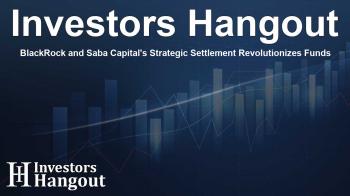BlackRock and Saba Capital's Strategic Settlement Revolutionizes Funds

Settlement Between BlackRock and Saba Capital Management
Recently, BlackRock (NYSE: BLK) and Saba Capital Management made headlines with their groundbreaking settlement, which puts an end to a longstanding conflict over the management of closed-end funds. This agreement marks a significant step forward for shareholders and investors alike, addressing key concerns about management practices in these funds.
Details of the Agreement
The asset management giant, BlackRock, has committed to repurchasing substantial portions of its shares in two specific funds: the BlackRock Innovation and Growth Term Trust and the Health Sciences Term Trust. The buyback involves 50% of outstanding shares in the former and 40% in the latter, valuing the transactions at approximately 99.5% of each fund's net asset value. This action represents a total tender offer of around $1.6 billion, marking an unprecedented opportunity for investors.
Implications for Saba Capital
In exchange for these repurchases, Saba Capital, which holds a significant stake in BlackRock's closed-end funds, has agreed to halt its pursuit of new director appointments and the removal of BlackRock as manager for certain funds. This truce is set to remain in effect for three proxy seasons, allowing for a period of stabilization and strategic realignment.
Reactions from Key Figures
Boaz Weinstein, the founder of Saba Capital, celebrated this resolution on social media, stating that it represents a milestone for shareholders. He emphasized the importance of collaboration between shareholders and management, leading to mutually beneficial outcomes. Weinstein's comments highlight the potential for unlocking value through shareholder-friendly actions and effective governance enhancements.
Historical Context of the Dispute
For years, Weinstein has been an advocate for change within closed-end funds, maintaining that these investment vehicles often carry excess fees and underperform relative to their benchmarks. His efforts have extended beyond U.S. borders, as he rallied investors in UK investment trusts to re-evaluate their management structures and seek better returns.
The Nature of Closed-End Funds
Closed-end funds operate differently from open-end funds; they do not regularly issue or redeem shares. This limitation can lead to discrepancies between the trading price of the funds and the actual value of their underlying assets, often resulting in unfavorable conditions for investors. The recent developments between BlackRock and Saba highlight the critical nature of governance and shareholder engagement in such structures.
Future Outlook for BlackRock and Saba Capital
The recent agreement not only underscores the necessity for ongoing dialogue between asset managers and shareholders but also indicates a changing dynamic in how closed-end funds are perceived and managed. As both parties move forward, the focus will likely remain on unlocking value while maintaining robust governance practices.
Frequently Asked Questions
What does the settlement entail for BlackRock's funds?
The settlement involves BlackRock committing to buy back a substantial percentage of shares in specific funds, improving the liquidity available to investors.
How long will the agreement between BlackRock and Saba last?
The terms of the agreement will last for three proxy seasons, during which Saba will refrain from its campaign for changes in management.
What are the primary concerns regarding closed-end funds?
Investors often face high fees and lackluster returns, raising concerns about the management practices and governance of these funds.
What is Boaz Weinstein's role in this settlement?
Boaz Weinstein, founder of Saba Capital, has been a key advocate for shareholder-friendly changes, and his efforts contributed to the recent resolution with BlackRock.
What might be the future for closed-end funds post-settlement?
The settlement may lead to improved governance practices and enhanced value for shareholders, potentially reshaping how closed-end funds operate moving forward.
About Investors Hangout
Investors Hangout is a leading online stock forum for financial discussion and learning, offering a wide range of free tools and resources. It draws in traders of all levels, who exchange market knowledge, investigate trading tactics, and keep an eye on industry developments in real time. Featuring financial articles, stock message boards, quotes, charts, company profiles, and live news updates. Through cooperative learning and a wealth of informational resources, it helps users from novices creating their first portfolios to experts honing their techniques. Join Investors Hangout today: https://investorshangout.com/
Disclaimer: The content of this article is solely for general informational purposes only; it does not represent legal, financial, or investment advice. Investors Hangout does not offer financial advice; the author is not a licensed financial advisor. Consult a qualified advisor before making any financial or investment decisions based on this article. The author's interpretation of publicly available data presented here; as a result, they should not be taken as advice to purchase, sell, or hold any securities mentioned or any other investments. If any of the material offered here is inaccurate, please contact us for corrections.
